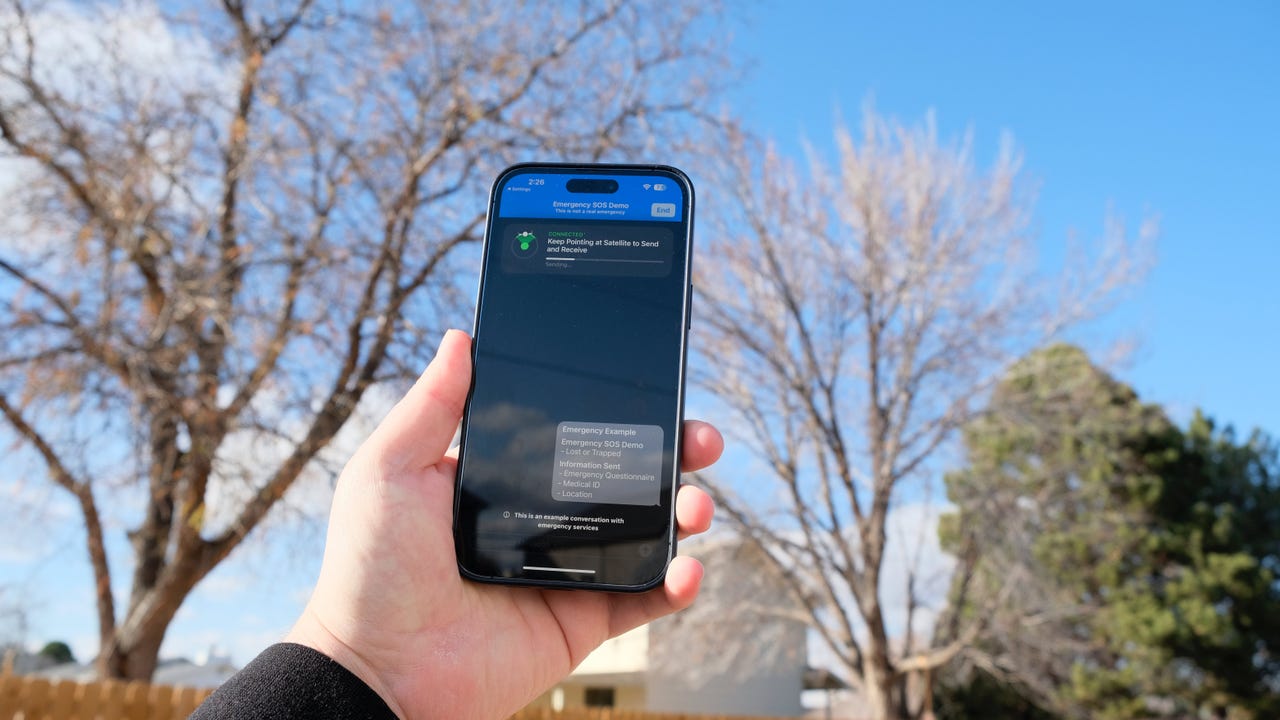
Emergency SOS via satellite on the iPhone 14 Jason Cipriani/ZDNET
It’s something that’s drilled into us at a very early age. If there’s an emergency, we should pick up the phone and dial 911 (or whatever the emergency number is in our country) and where we’ll quickly be connected to the calm, comforting voice of a trained professional who will do everything they can to help.
But what if the cell towers are dead, or the landlines are down, and there’s no calm voice on the other end?
Also: The top satellite phones and gadgets for reliable off-grid communication
The good news is that you may already own a gadget that will give you access to the constellations of communications satellites orbiting high above, satellites that are immune to the goings on here on the ground, and you might not even know it.
Michael J. Miraflor (via Gizmodo) posted screenshots showing how this works following an emergency. Miraflor’s “brother’s girlfriend’s cousin and his family” suddenly found themselves surrounded by wildfires on the Hawaiian island of Maui with no cell service.
My brother’s girlfriend’s cousin and his family were caught in their vehicle in Maui while the wildfires suddenly erupted around them.
No cell service, so Apple Emergency SOS was the only way they could get in contact with first responders. Literally saved their lives. pic.twitter.com/PpxNwTGOAf— Michael J. Miraflor (@michaelmiraflor) August 10, 2023
It’s an excellent example of how modern technology can be employed to save lives.
So, how do you know if you have a smartphone that can communicate using satellites?
Well, if you own an iPhone 14 or iPhone 14 Pro, your phone has a feature called Emergency SOS via satellite, which, as the name suggests, allows you to call for assistance using satellites.
Didn’t know you had this superpower at your disposal? Well, now’s the time to test it out.
Also: Apple’s Emergency SOS via Satellite vs. Garmin inReach Messenger: Your best rescue tech option
I’m a huge believer in getting to know how something works before you need it. I’ve seen people struggle for over an hour in a panic trying to start a gasoline generator in the dark only to find out it didn’t have any gas in it, or settle down to read the instructions for some essential bit of kit as a massive storm approaches.
You don’t want to be that person.
To experiment with a demo Emergency SOS via satellite (don’t worry, this doesn’t put you in touch with the emergency services), tap on Settings and find Emergency SOS, tap on that, and scroll down to Try Demo.
Emergency SOS via satellite demo on the iPhone 14 Apple
This will allow you to get a feel for how it works before you’re experiencing an emergency. You’ll discover that you need a clear view of the sky, and that it’s normal for the connection to take time — maybe even a minute or more — to find satellites. Knowing this in advance and being prepared can help alleviate some of the stress and anxiety if it’s needed during an emergency.
Don’t have an iPhone 14 or 14 Pro? You have options.
Also: I tested this tiny satellite communicator on an off-grid adventure. Here’s my verdict
While there’s no Google equivalent to Apple’s Emergency SOS via satellite, there are some Android handsets that have built-in satellite connectivity, such as the Cat S75. Although, if you have this device, you’re likely to know that you have this service because you’ll be paying a monthly or yearly subscription for it.
An alternative to a smartphone that has built-in satellite connectivity is a separate satellite communicator, such as the Garmin inReach Messenger, the Garmin inReach Mini 2, or Motorola Defy. These can not only be used in an emergency — all of these devices feature an SOS button that, if pressed, connects you to an emergency response center — but can also be used to send and receive messages.
These again require a subscription to access the satellite network.
ZDNET RECOMMENDS
Garmin inReach Messenger
Small, rugged, lightweight satellite communicator with two-way text messaging. Built-in rechargeable lithium battery gives up to 28 days of battery life in 10-minute tracking mode.
View at Amazon
Whatever system you have, I highly recommend that you become familiar with how it works before you need it. In the middle of an ongoing emergency isn’t the best time to be Googling for instructions.
Featured reviews




















